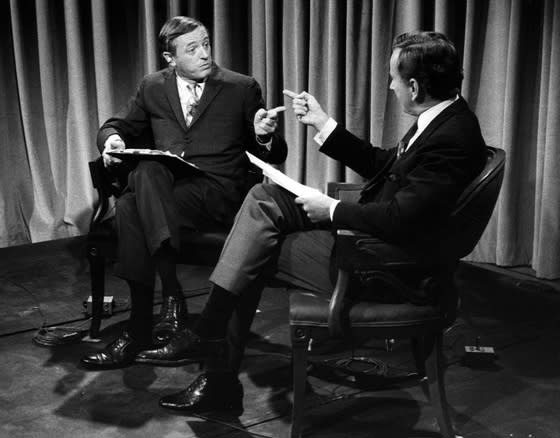Given how easy it is to turn on any of the countless news programs and find two pundits from different sides of the aisle screaming over each other about "the issues," it's hard at this point to even imagine a time before the existence of this kind of cacophonous political discourse. In tracing its insidious origins back to a series of televised debates between Gore Vidal and William F. Buckley Jr. during the 1968 Democratic and Republic presidential conventions, Best of Enemies manages to be both insightful and scathingly funny in equal measure.
Believe it or not, TV networks at that time found a way to be fair and balanced in their coverage without resorting to empty histrionics. Lagging behind NBC and CBS in their election coverage, ABC made a desperate and ultimately influential decision to forego gavel-to-gavel coverage of the conventions in favour of a debate between Vidal and Buckley.
The film goes to great lengths to paint Vidal and Buckley as flip sides of the same prestigious coin: Vidal came from a family of politicians, but followed his writing gifts into a career as a novelist and reputed orator; Buckley was the well-educated founder of the political magazine National Review who also possessed an uncanny way with words. If it weren't for the fact that Vidal was an outspoken Democrat and Buckley a staunch conservative, the two might have even been friends.
But the lurid pleasure here is in revisiting the two verbose heavyweights in their prime as they clashed in front of a captive national television audience that had never been exposed to the kind of vitriol that's now become commonplace. Against the backdrop of a makeshift ABC studio that's practically falling down around them and a Chicago Democratic convention that escalates into a full-scale riot, Buckley and Vidal assail and parry with the kind of barbed wit that's in scarce supply on TV today until things eventually reach a breaking point.
Directors Morgan Neville (20 Feet From Stardom) and Robert Gordon are smart to have commentators like Christopher Hitchens establish the context for the debates, but they are also wise enough to know when to allow the electrifying footage speak for itself. The climax of their fracas seems perhaps even more incendiary now, given the current climate of political correctness, but it's the way the media first placed a higher value on theatre rather than actual politics that's had far more damaging reverberations over time.
(VSC)Believe it or not, TV networks at that time found a way to be fair and balanced in their coverage without resorting to empty histrionics. Lagging behind NBC and CBS in their election coverage, ABC made a desperate and ultimately influential decision to forego gavel-to-gavel coverage of the conventions in favour of a debate between Vidal and Buckley.
The film goes to great lengths to paint Vidal and Buckley as flip sides of the same prestigious coin: Vidal came from a family of politicians, but followed his writing gifts into a career as a novelist and reputed orator; Buckley was the well-educated founder of the political magazine National Review who also possessed an uncanny way with words. If it weren't for the fact that Vidal was an outspoken Democrat and Buckley a staunch conservative, the two might have even been friends.
But the lurid pleasure here is in revisiting the two verbose heavyweights in their prime as they clashed in front of a captive national television audience that had never been exposed to the kind of vitriol that's now become commonplace. Against the backdrop of a makeshift ABC studio that's practically falling down around them and a Chicago Democratic convention that escalates into a full-scale riot, Buckley and Vidal assail and parry with the kind of barbed wit that's in scarce supply on TV today until things eventually reach a breaking point.
Directors Morgan Neville (20 Feet From Stardom) and Robert Gordon are smart to have commentators like Christopher Hitchens establish the context for the debates, but they are also wise enough to know when to allow the electrifying footage speak for itself. The climax of their fracas seems perhaps even more incendiary now, given the current climate of political correctness, but it's the way the media first placed a higher value on theatre rather than actual politics that's had far more damaging reverberations over time.




